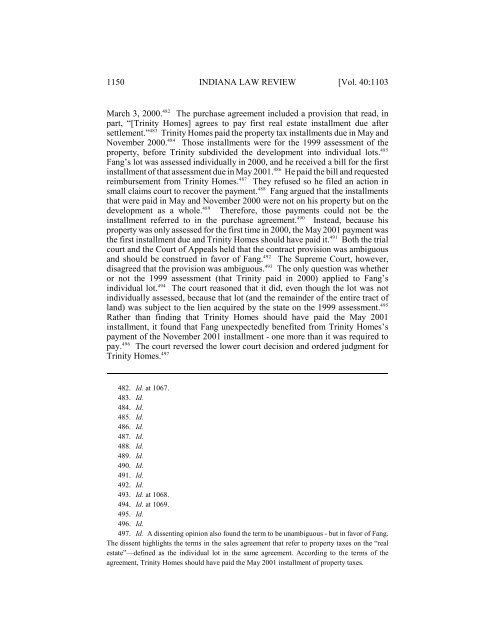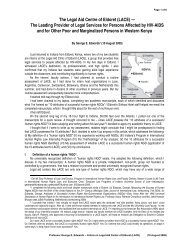Recent Developments in Indiana Taxation - I.U. School of Law ...
Recent Developments in Indiana Taxation - I.U. School of Law ...
Recent Developments in Indiana Taxation - I.U. School of Law ...
You also want an ePaper? Increase the reach of your titles
YUMPU automatically turns print PDFs into web optimized ePapers that Google loves.
1150 INDIANA LAW REVIEW [Vol. 40:1103<br />
482<br />
March 3, 2000. The purchase agreement <strong>in</strong>cluded a provision that read, <strong>in</strong><br />
part, “[Tr<strong>in</strong>ity Homes] agrees to pay first real estate <strong>in</strong>stallment due after<br />
483<br />
settlement.” Tr<strong>in</strong>ity Homes paid the property tax <strong>in</strong>stallments due <strong>in</strong> May and<br />
484<br />
November 2000. Those <strong>in</strong>stallments were for the 1999 assessment <strong>of</strong> the<br />
property, before Tr<strong>in</strong>ity subdivided the development <strong>in</strong>to <strong>in</strong>dividual lots. 485<br />
Fang’s lot was assessed <strong>in</strong>dividually <strong>in</strong> 2000, and he received a bill for the first<br />
486<br />
<strong>in</strong>stallment <strong>of</strong> that assessment due <strong>in</strong> May 2001. He paid the bill and requested<br />
487<br />
reimbursement from Tr<strong>in</strong>ity Homes. They refused so he filed an action <strong>in</strong><br />
488<br />
small claims court to recover the payment. Fang argued that the <strong>in</strong>stallments<br />
that were paid <strong>in</strong> May and November 2000 were not on his property but on the<br />
489<br />
development as a whole. Therefore, those payments could not be the<br />
490<br />
<strong>in</strong>stallment referred to <strong>in</strong> the purchase agreement. Instead, because his<br />
property was only assessed for the first time <strong>in</strong> 2000, the May 2001 payment was<br />
491<br />
the first <strong>in</strong>stallment due and Tr<strong>in</strong>ity Homes should have paid it. Both the trial<br />
court and the Court <strong>of</strong> Appeals held that the contract provision was ambiguous<br />
492<br />
and should be construed <strong>in</strong> favor <strong>of</strong> Fang. The Supreme Court, however,<br />
493<br />
disagreed that the provision was ambiguous. The only question was whether<br />
or not the 1999 assessment (that Tr<strong>in</strong>ity paid <strong>in</strong> 2000) applied to Fang’s<br />
494<br />
<strong>in</strong>dividual lot. The court reasoned that it did, even though the lot was not<br />
<strong>in</strong>dividually assessed, because that lot (and the rema<strong>in</strong>der <strong>of</strong> the entire tract <strong>of</strong><br />
land) was subject to the lien acquired by the state on the 1999 assessment. 495<br />
Rather than f<strong>in</strong>d<strong>in</strong>g that Tr<strong>in</strong>ity Homes should have paid the May 2001<br />
<strong>in</strong>stallment, it found that Fang unexpectedly benefited from Tr<strong>in</strong>ity Homes’s<br />
payment <strong>of</strong> the November 2001 <strong>in</strong>stallment - one more than it was required to<br />
496 pay. The court reversed the lower court decision and ordered judgment for<br />
Tr<strong>in</strong>ity Homes. 497<br />
482. Id. at 1067.<br />
483. Id.<br />
484. Id.<br />
485. Id.<br />
486. Id.<br />
487. Id.<br />
488. Id.<br />
489. Id.<br />
490. Id.<br />
491. Id.<br />
492. Id.<br />
493. Id. at 1068.<br />
494. Id. at 1069.<br />
495. Id.<br />
496. Id.<br />
497. Id. A dissent<strong>in</strong>g op<strong>in</strong>ion also found the term to be unambiguous - but <strong>in</strong> favor <strong>of</strong> Fang.<br />
The dissent highlights the terms <strong>in</strong> the sales agreement that refer to property taxes on the “real<br />
estate”—def<strong>in</strong>ed as the <strong>in</strong>dividual lot <strong>in</strong> the same agreement. Accord<strong>in</strong>g to the terms <strong>of</strong> the<br />
agreement, Tr<strong>in</strong>ity Homes should have paid the May 2001 <strong>in</strong>stallment <strong>of</strong> property taxes.




